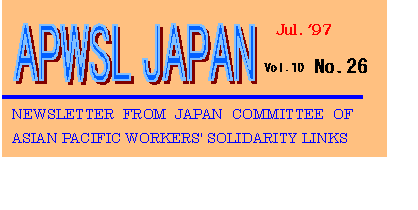

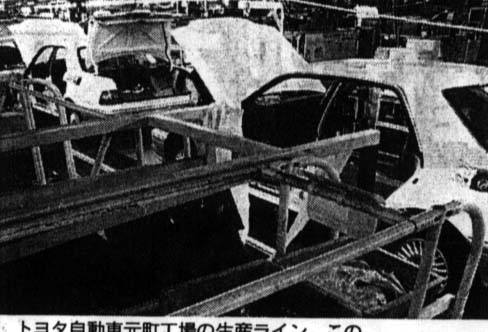
A fire at the Okaya 1st Factory of
the Aishin Precision Machinery Co., an affiliated firm of Toyota
Motors Co., on Feb. 2 was the biggest event of the 1997 spring
offensive in the automobile industry. The factory produces only
proportional valves(PV) for brakes and Toyota has used Aishin's
PV with more than 90% of their product lines. The fire at the
factory stopped the production and delivery of the PV, so
Toyota's factories, which are famous for their "Just In Time
System(JIT)" were forced to stop production. Some factories
of Mitubishi Motors Co., Suzuki Motors Co. and Isuzu Motors Co.
which use Aishin's PV also stopped their production.
These facts made clear to everyone that the Japanese auto
industry greatly depends on outsourcing (whereas the United
Automobile Workers Union went on strike over outsourcing). It
also made clear that Japanese society has become primarily a@
productivity-oriented enterprise society@@ as if the whole
society were one conveyer belt.
Toyota ordered more than 20 companies, including nonaffiliated
companies, to produce the PV. The affiliated companies worked
hard for 24 hours per day. As a result, the stop of production
lasted only for 4 days. The reopened factories of Toyota and
Mitubishi forced their workers to work overtime every day and
work@ even on holidays to recover the delay in@ production.
The Chairman of Toyota said "It's not wrong that we produce
the necessary volume of parts. We learned from the fire accident
and will prepare to prevent fires." He means to promote more
out sourcing and increased productivity. Although Toyota is said
to have reconsidered its productivity-oriented JIT system after
the end of Bubble Economy, as the economy recovered, it seems to
have forgotten that idea. The thoughts and activities of managers
are similar among any countries.
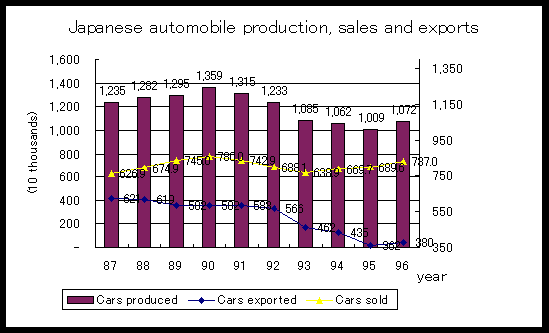
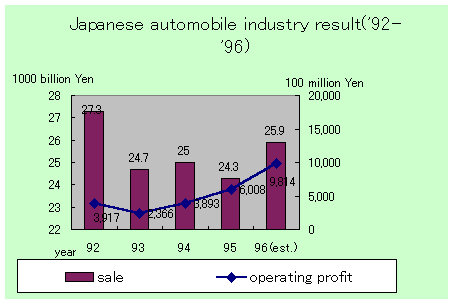
@
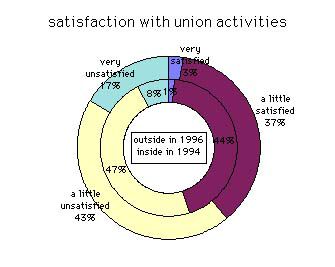
The Japan Auto Workers Union(JAWU,@
780,000 members) demanded a 13,000 yen wage increase which was
1,000 yen more than last year. Their@ reasons were that car
production has increased more in the last year than in the past 6
years (see figure 1) and both the increase of sales and the
profits are more than the previous year (see figure 2).
Furthermore, profits from the increasing currency exchange rate
are expected. JAWU demanded 5 months wage as a standard bonus and
the unions, which could not achieve a reduction to 1,952 working
hours in a year, demanded that their working hours be shortened
to the standard. (JAWU demanded a 20 minute decrease per day last
year, but it was rejected.)
The Japan Federation of Employers' Associations proposed that
profitable Japanese enterprises should increase the bonus instead
of increasing wages in order to strengthen their competitive
power in the international market. On the other hand, JAWU
regarded the wage increase more seriously than a bonus increase,
so it intended to get a 10,000 yen wage at Toyota.
Negotiations between employers and employees was difficult. The
union side could not break the hard stance taken by managements
that "We must restrain the increase of wages to ensure
international competitive power" (quoted from Nissan's
negotiation). The problem was the abstract attitude of unions
from a psychological standpoint where they "want to be
rewarded for their cooperation with contraction of the
enterprises after the collapse of Bubble Economy" (from
Nissan's negotiation), and they feel they "must strengthen
workers' will and power to make their best effort in order to
create the future of their enterprises" (from the Toyota's
negotiation).
The results are shown in Table 1. The average wage increase was
the previous year's achievement plus 700 yen. The bonus demand of
the union was fulfilled. Toyota's union said "We think that
the employers expect their employees to make their best effort in
the future". It showed that mutual understanding between
employers and employees has proceeded, and so has the drive to
export@ Japanese cars to the USA while the UAW was striking,
instead of showing solidarity with them.
The union members will never believe their unions' activities. A
study of Nissan Union in last year shows that 60.9 % of members
complain about their union's activities.
<caption
Production stopped at the Toyota Motomachi Factory
@
@
This April, APWSL Japan visited the United States for the first time as its fourth alternative tour.@ The original plan for the tour was for a small number of people to participate in the Labor Notes Conference.@ In the end, taking into account the increasing interest here in the changes in the American labor movement, the tour was replanned as an alternative exchange program, to which APWSL-Japan invites workers to join and visit with unionists in the USA.@ Ten people participated in the tour, and for most of us it was our first time to visit the States.
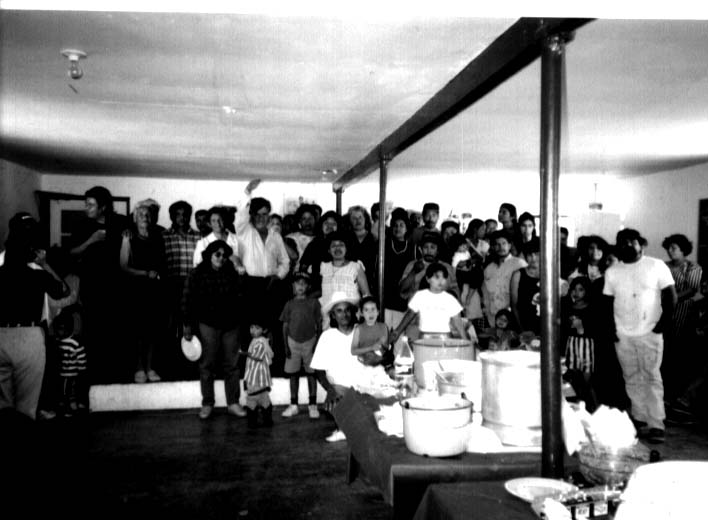
@
The participants were impressed by
the new trends in the American labor movement such as the effort
to organize migrant and women workers, and solidarity actions
with Mexican and Canadian workers.@ Our group was able to
attend the picket line in front of the Hotel New Otani in Los
Angeles and to participate in a support rally for the striking
Detroit News workers.@ We had a great experience joining in
these energetic and lively actions.
Our relations with the North American workers started by
supporting the Bridgestone Firestone workers and has developed
through supporting workers at the Hotel New Otani.@ This tour
to the United States was another step towards strengthening the
relations between workers across the Pacific.@ The following
two reports are by participants of the tour.
Yamasaki Seiichi, APWSL-Japan Secretary General.
<caption
With the New Otani Workers Support Committee
@
@
Soon after we arrived in Detroit,
we participated in the Labor Notes Convention and a rally.@
Afterwards, we enjoyed ourselves by visiting an art museum and a
jazz club and by going to an Indian restaurant in Windsor, the
city just across in Canada, with local labor activists.@ On top
of our jet lag, we felt so exhausted because for three days we
discussed late into the night about ourselves and our union
activities as we got to know each other.
At the Labor Notes Convention, it was difficult for us to
understand the English, but gradually we learned about the
problems U.S. workers face, which was quite an eye-opener.@ We
heard about the adoption of the Japanese management system,
relocation of factories to reduce labor costs, a worsening of
working conditions, and resistance to corporate restructuring
plans.@ In addition, we were impressed that there were so many
female and international labor activists in the USA.@ The only
thing we regret about the tour is that we could not talk more
with workers from the United Auto WorkersΤ Union (UAW) and NUMMI.@ Although we could
contact some people from the UAW and Local 909, we wish we could
have discussed more issues, such as the adoption of the Japanese
management system, the outsourcing of automobile parts, and
lay-off problems.
In Los Angeles, we met with employees of the New Otani Hotel and
Garden, a janitors union, university staff and graduate students
who are trying to form their own labor unions for teaching
assistants.@ We participated in a demonstration in front of the
Hotel New Otani, our third during our stay in the USA.@ We were
excited by the lively chants.@ Many of the people active in
trying to form a union there are minorities and women, and their
struggle for better working conditions@ is part of their
declaration of their rights as United States citizens.@ I was
struck by the remark made by an employee of the Hotel New Otani,
Librado Vidaurri, that unions should not only focus on economic
struggle but also on maintaining each employeeΤs dignity and
pride in their workplace.@
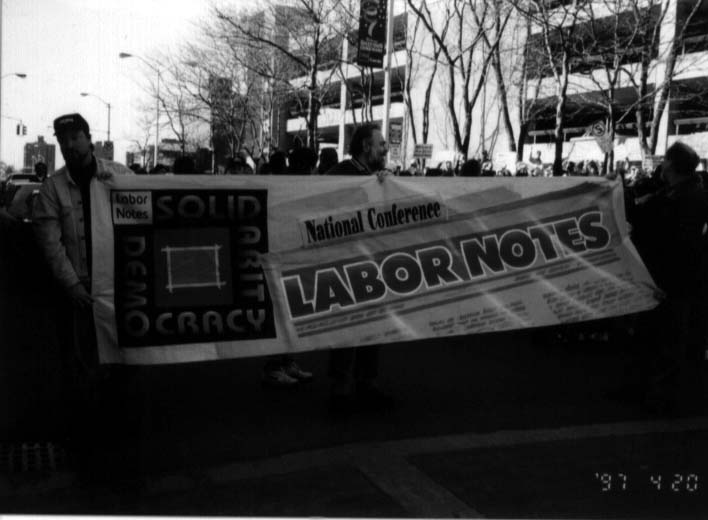
@
When we reached the maquiladora
area in Tijuana, Mexico, the scenery changed dramatically.@
There is dry grass on the hills where some factories and employee
housing are located.@ I heard that there are approximately
1,000 factories of companies from abroad.@ Our guide, Mary
Tong, of the Support Committee for Maquiladora Workers, explained
to us that the working conditions of those factories are horrible
and that those companies can do whatever@ they want under the
protection of the Mexican government.@ We were able to meet
Mexican labor activists who are fighting against the low wages,
poor working conditions, industrial accidents, infringements of
human rights, pollution, and lay-offs there, even though whenever
a labor union is about to be formed, management threatens to
shut-down the factory.
Next we visited a nearby community called Maclovio Rojas.@ It
was originally a rural community, but as the maquiladora
factories moved in, corporations and gangsters started buying up
the land.@ As a result, the residents of the area, primarily
farmers and factory workers, formed a community organization to
resist them.@ They constructed meeting halls, a kindergarten,
schools and labor union offices by themselves, although they are
very simple.@ In addition, for senior citizens who cannot work
in the factories, the union has tried to help them set up their
own businesses, resulting in most of the residents becoming
independent.@ They also told us that management was scared by
the existence of the union and raised employeesΤ salaries.@ As with other communities, they
have proven that it is more effective to organize a union based
in the community rather than within a company.@ Support and
cooperation from abroad has also strengthened labor union
activities in this area.@ In this sense, it was very meaningful
for us to travel to the USA and we deeply hope to continue
building up international support and solidarity with each other.
by Uehara Hiroshi
(Autoworkers Exchage Conference)
Translated by Tanaka Yuri
<caption
A protest rally in support of the striking Detroit Newspaper
Union by the participants of the Labor Notes convention(Apr.
20,1997)
@
@
When I went to the Labor Notes
Conference in Detroit, I felt a big difference between the
situations of union members in the US and Japan, because many
women union members joined and took initiative in that
conference. In Japan, recently, union membership(especially among
women) is decreasing. Regardless of what type of job, most women
workers are unorganized.
In the late 1980s, the term "Sexual Harassment " was
introduced in Japan. We could finally have an adequate word to
express how we have to face discrimination, difficulties, or
troubles in the workplace, how we are bothered during our daily
work. But in fact it is very difficult to prove what sexual
harassment is because even among women, whether a feeling is
unwelcome depends on each woman. But sexual harassment is used as
a tool by management to exclude women from the workplace without
using any action of dismissal. In fact, it is implicitly a kind
of forced dismissal against women.
Since 10 years ago, women have gradually raised their own voices
and fought against sexual harassment. Some independent women's
labor unions and women's support groups have been set up in
Japan. These unions and groups offer telephone hotlines and if a
survivor wants to fight back, they advise on several ways how she
can fight back and support her action. Recently existing unions,
including those affiliated with Rengo, have started to deal with
some cases of sexual harassment. But still now most women who
have experienced sexual harassment have left their work place
involuntarily. The following is an example of a sexual harassment
case.
Sexual Harassment at the Rengo Shiga(the Shiga local of the Japan
Trade Union Confederation)
Ms.A(we usually use anonymity if a survivor requests it) had
worked as clerical staffperson in the office of the Rengo Shiga.
In 1990, Rengo campaigned to get the summer holiday. A poster
with a caption saying "Please come back and we wish you will
be a new person") was distributed in the office. One of the
executive members, Mr. N, said to her "Put the poster in the
front of the Rengo Shiga office, we wish to recruit a new woman
and get rid of the old woman. " At a social gathering of the
office workers, Mr. N said to A, " Will you still work in
the office? We are unhappy!". The next year, after a social
event of the office staff, Mr. N hit and kicked her on the
street. She suffered an injury that took a week to heal up, and
also she experienced a severe emotional shock. Then Ms. A
protested against Mr. N and she also complained to Mr. T(the
chairperson of the Shiga Rengo) about the series of rude
behaviors of Mr. N. However, the chairperson claimed that these
incidents are the result of a personal trouble of Ms. A in
connection with the relationship between a woman and a man, so
the chairperson ignored N's harassment against her. Soon after,
Mr. Y, who was a director general of the union, also joined in
the harassment against her. For example, Mr. Y made a complaint
against her that she didn't keep his desk neat and clean while
she attended a local union brunch of a union formerly affiliated
with Domei(Japan Conference of Labor). Also, Y forced her to make
and serve a tea and to buy him cigarettes. And Y said to her that
those things were her duty, so she had to obey him or otherwise
leave her job. And when Mr. Y and Mr. N created the job
assignment table, they omitted the name of Ms.A. So Ms. A
demanded the chairperson to improve the bad working conditions in
the office, but the chair person ignored her voice. As a result,
Ms. A left the Shiga Rengo.
However Ms. A didn't accept such a series of harassments by the
Shiga Rengo, so she went to the head office of Rengo in Tokyo and
demanded that they improve the working conditions in the office
of the Shiga Rengo. The head office tried to take action against
the Shiga Rengo, however they obstinately ignored her demand.
This kind of attitude and behavior of the Shiga Rengo is a
typical environment of sexual harassment. Even quid pro quo
sexual harassment is still not recognized in our society. When
Ms. A filed a suit at the Shiga court, Shiga Rengo published that
the incidents had been caused by the emotional and personal
problems of Ms. A" in the union magazine "Rengo
Shiga". And the Shiga Rengo appealed that they had no
obligation to her to the Shiga district court. So Ms.A also
brought a libel suit to the Shiga district court. The district
court decided that the Mr. N. had assaulted Ms. A(Mr. N was
ordered to pay \300,000 for the compensation), and that
publishing comments about her personality in the union magazine
were considered as libel(the Shiga Rengo was ordered to pay
\200,000 for the compensation). But the district court ignored
the environment of sexual harassment against Ms. A. Concerning
the series of daily harassments at the Shiga Rengo, the judge
commented that the incredibly incoherent statements of those
executives might apply as discrimination against women, but in
this case they said those things about every woman, and were not
directly pointed at Ms. A . The judge decided that there was no
forced dismissal of Ms. A and that she had suffered not so
serious emotional damage, so she did not need legal protection.
The judge did not put the blame for the irresponsibility of the
employer on the Shiga Rengo. Both parties appealed to the Osaka
High Court, where the appeal trial started on July 1.@
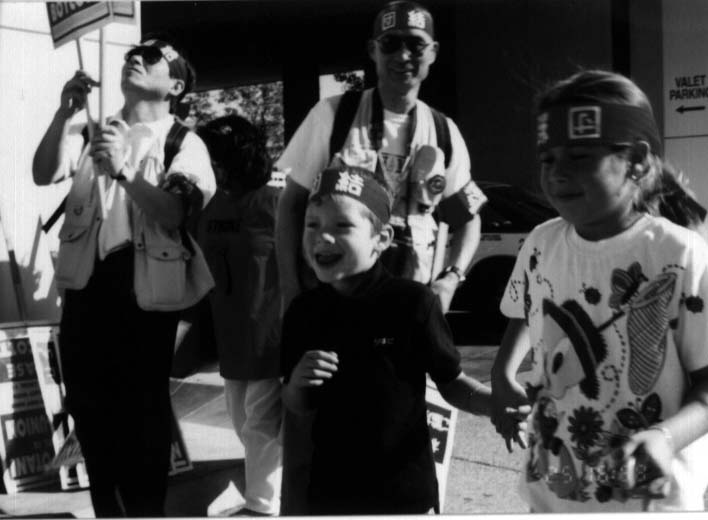
@
This case is not an exceptional
case in Japan. In most companies, there is an environment of
harassment in most labor unions in Japan. We continue to fight
against all sexual harassment, to support the survivors who have
experienced sexual harassment, and to empower and be in
solidarity with each other.
@
By Kitahata Chiyoko
<caption
1. With the people at Macrovio Rojas, Tijuana
2. The children wearing hachimaki are cheerful in front of the
picket line at the New Otani Hotel in Los Angeles
@
@
A bill to revise the Equal
Employment Opportunity Law and the Labor Standards Act, including
the deletion of clauses which made special protections for female
workers, went into effect on June 11 when it was passed by the
Upper House of the Diet.@ In the final version of the bill, two
supplementary clauses were attached to the original 12 clauses
which were approved earlier by the Lower House of the Diet.@ In
addition, a voluntary appeal was made by some female members of
both Houses.
Since both the supplementary clauses and the appeal call for
better enforcement of the Sex Discrimination Prohibition Law, it
is somewhat of an improvement over the Equal Employment
Opportunity Law, but the present revisions do not go far enough.@
In response to the problem of indirect discrimination against
women workers stemming from their concentration in low-wage,
part-time, temporary, dispatch, or non-management track jobs, and
in family-run businesses where a male is the householder, the
Diet Resolution merely stated that it would "examine the
meaning of discriminatory treatment on an on-going basis."@
Another clause states that the Diet must examine ways to correct
wage discrimination immediately, which is one of the aims of the
Labor Standards Act, by analyzing the factors that cause the gap
between men`s and women`s wages.@ It may be too late to discuss
this issue now, but there is nothing else we can do other than to
see that these provisions are carried out.
Six of the 14 clauses concern the consideration of appropriate
measures for overtime, late-night and holiday work for women and
a substantial revision of the Part-Time Labor Act@ and its
guidelines as a result of the deletion of clauses in the Labor
Standards Act designed to protect female workers.@ Although
these measures reflect the discussion of the revisions by the
Committees on Labor Affairs of both Houses, we can say that they
suggest that the deletion of clauses to protect female workers is
part of the proposed deregulation of the entire labor market and
will affect not only women workers, but the lives and health of
all workers.An article about the revisions of the labor law ran
in the Asahi Newspaper on June 11 with the subheading
"Equality of Overwork is the Problem".@ To abolish
the protective regulations without improving the harsh working
conditions in Japan under which karoshi, or death from overwork,
continues to plague workers, will only drive women into a labor
force which engages in overwork, making it difficult for women to
take care of household responsibilities and threatening their
health.@ As a result, the revision will make it increasingly
difficult to continue working as a full-time worker.@ This is
the kind of "flexible employment system" that
Nikkeiren, the Japan Employers` Federation, is aiming for.
Japan Railways has already adopted a system of 11-hour workdays
for one month periods as a variation of its work schedule.@
Moreover, it is considering the introduction of late-night work
after 10 pm, not for its regular employees, but for the workers
in its newsstands on the grounds that its customers need them to
be open until midnight.@ Having flower shops and newsstands
open past 10 or 11 pmΡis this what is meant by a
"developed country" which responds to the needs of its
citizens?
A woman who worked in a finance-related business said that she
worked overtime everyday and did not get paid for it.@ Her
employer said that the company only assigned her an amount of
work which could be done during normal working hours, so if she
could not finish her work it must be due to her own lack of
ability.@ Thus we can get a glimpse of the meaning of
"discretionary work".
At the end of July, the government will publish an interim report
which addresses proposed revisions of the labor laws dealing with
working hours, labor contracts, and the labor market, all of
which are vital issues for workersΤ rights.@ If the term "labor market
deregulation" means "freedom" for companies to
obtain workers at a very low cost only for the times they need
them, then human history will be taking a step backwards.@ It
is necessary for us to fight against deregulation which is
becoming a common trend around the world through the solidarity
of workers and labor unions.
by Yunoki Yasuko
(Zensekiyu Shell Oil Union)
Translated by Araya Yukie
(Transnational Labor Studies)
@
@
The formal start of the
"National Network in Solidarity with Migrant Workers"
was announced at the 2nd Annual National Forum on the Problems of
Migrant Workers, which was held in Aichi Prefecture, near Nagoya,
on April 28-29. The initiative is a response to a broad appeal
made at the 1st Annual National Forum held in Fukuoka last year.
Three appeals were made then:@
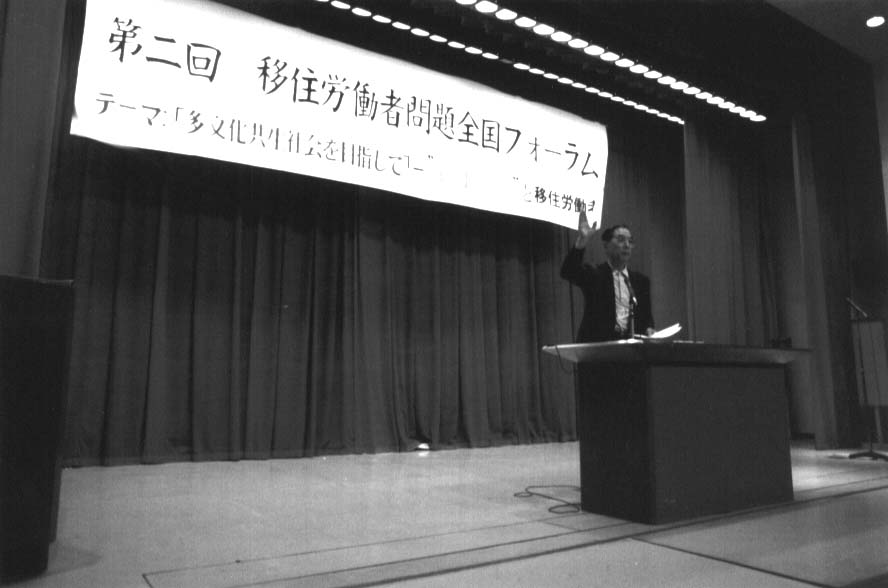
1) Many group representatives wanted to strengthen the national network with a more continuous structure after accomplishing the opening of First Annual National Forum.
2) There was a desire to put in a more organized form the functioning network which had been coordinated on a voluntary basis by the Ajiajin Ijuu Roudousha Konshinkai (Ajikon, or the Association for Asian Migrant Workers).
3) It was decided to deepen the cooperation and progress made by various groups on labor issues and the problems of Japanese-Filipino children (stateless children).
Considering the above
accomplishments, since last year, Ajikon and various Tokyo area
labor organizations have been meeting with each other and
maintaining contact with groups in the Kansai and Kyushu on a
regular basis, carefully working out a plan for the
"National Network". Based on the recommendations
gathered in this process, there was much discussion at this
year's Annual National Forum, including a session entitled
"Towards an Organizational Network for Supporting Foreign
Workers" and a special program where representatives from
each interested group discussed the details of the proposal late
into the night. A definite plan hammered out in these meetings
was proposed at the General Meeting on the second day of the
National Forum. After several revisions were made, an
"Agreement (Rules and Regulations)" and a temporary
"Aims of Action" were adopted. There will be a steering
committee with 6 co-representatives and 22 individual or group
candidates on it. Group representatives are requested to be
selected by the organizational rules of the participating groups.
A permanent staff member was nominated at the first steering
committee meeting and Yui Shigeru, chairperson of the Executive
Committee of the Second National Forum on the Problems of Migrant
Workers, was formally appointed.
As a result of the long process of discussion, it was concluded
that when the "National Network" makes statements and
engages in actions, it will be with the consensual agreement of
the affiliated individuals and groups. The "National
Network" will principally coordinate joint actions. It was
thought that this form was necessary due to the diversity of
citizens' groups participating, among whom there is a wide
variety of activities, membership and organizational structures.
It will probably take some time before the steering committee
becomes fully functioning and the concrete activities are
organized.
In particular, many changes will have to be made as the Ajikon
(Association for Asian Migrant Workers) office is combined into
the new structure. Members of Ajikon's steering committee will
join the steering committee for the National Network. Ajikon's
bimonthly newsletter, "Ijuu Rodosha Tsushin" (Migrant
Worker News) will be transformed into an organizational
newsletter for the National Network, with a new editor, editorial
plan and subscription policy.
The following is an outline of the organizational structure and plans of the National Network:
1. The name of the network is "Ijuu Roudousha to Rentai Suru Zenkoku Nettowaaku" or "National Network in Solidarity with Migrant Workers".
2. Purpose:
a. To protect the rights of migrant workers and foreign residents, to support activities which promote their independence, and to help make Japan into a multicultural/multiethnic society.
b. In order to accomplish the above, this Network aims to link on a national scale groups and individuals active in every region of Japan and in all fields concerned with migrant workers.
c. The Network aims to facilitate the exchange of information and strengthen the system of mutual cooperation while coordinating joint actions among the members.
3. The office will be located at the following address: c/o Nippon Christian Conference (NCC), 2-3-18-24 Nishi-Waseda, Shinjuku-ku, Tokyo-to.
4. Activities: The following are some short-term goals of the Network:
a. To collect and to supply information to the migrant workers' support groups nationwide.
b. To publish a newsletter.
c. To hold national meetings of representatives from member groups.
d. To select the site for a national forum to be held every other year and to help make the necessary arrangements for it.
e. To be a contact point for information about regional forums.
f. To be a contact point as necessary to help coordinate activities on nationwide or large-scale issues.
g. To make policy proposals.
h. To coordinate lobbying of the government, administrators and Diet members.
i. To function as an information center or contact point for overseas networks.j. To provide support for movement building in local areas.
k. To plan campaigns to influence public opinion.
l. Other activities as necessary.
5. A Tentative Plan of Action for the National Network in Solidarity with Migrant Workers
The period from 1997 to 1999 will be one of starting up and we plan to strengthen the National Network by pursuing the following plan of action.
1. Establishing the Secretariat
With the cooperation of groups and individuals in the Kanto Area, we plan to strengthen the functioning of the secretariat by coordinating negotiations with the government and by collecting and disseminating information through the publication of a newsletter.
2. Coordinating Action on Major Issues
We plan to deepen our discussion of the following issues and once there is an agreement of opinion about what actions to take, we will carry out:
a. Negotiating with the Labor Ministry for the guarantee of the labor rights of migrant workers regardless of visa status, in particular the rights to organize a union and to bargain collectively.
b. Opposing the worsening of the immigration laws and to negotiate for the guarantee of visa status (in particular, amnesty for long-term overstayers) with the Justice Ministry as part of a campaign for migrant workers' rights.
c. To negotiating with the Health and Welfare Ministry for the establishment of rights for all foreign workers to join the national health insurance plan.
d. To negotiating with the relevant ministries and agencies for the protection of the rights of foreign women with regard to employment, marriage, divorce, violence and child-rearing.
e. Making demands of the relevant organs of government to solve the problems of prostitution.
f. Negotiating with the relevant organs of government to protect the rights of children with at least one foreign national parent.
g. Supporting the organization of migrant workers with the aim of promoting their independence.
h. Supporting campaigns against police and other kinds of repression as well as for court cases.
by Watanabe Hideo, Chairperson of Kalabaw no Kai (The Association in Kotobuki for Solidarity with Foreign Migrant Workers); updated by Ogasawara Kimiko, staff member of Ajikon.
Translated and edited by John McLaughlin, APWSL-Japan
<caption
@The 2nd Annual National Forum on the Problems of Migrant Workers was held in Aichi Pref. in April.
@
@
@
From this issue, we have decided to include a report of APWSL-JapanΤs activities in English to give readers a better understanding of what the organization does.@ Japanese members receive monthly updates of the groupΤs activities, but so far nothing has been published in English.@ The report will feature highlights of activities mentioned in these updates or important issues on the agenda of the monthly steering committee meetings.
APWSL-Japan Steering Committee
meetings were held on May 8, June 5 and July 4 at the Kanagawa
City Union office in Kawasaki.@ There was no meeting in April
due to the APWSL-Japan sponsored visit to the USA in the latter
part of the month.
@
@
1.@ At the May meeting, we reviewed the visit in early April by the delegation of workers from the New Otani Hotel & Garden in Los Angeles and organizers for the Hotel and Restaurant Employees Local 11.@ They held many leafleting events in front of the New Otani Hotel in Akasaka as well as in front of the offices of major shareholders around Tokyo (and Osaka, of course).@ The leafleting on April 2 was sponsored by APWSL-Japan, which is the first labor action independently sponsored by the organization in its history (a technicality really since most of the same supporting groups participated Ρ usually such events are under the banner of a joint effort or coalition Ρ but it may point to new directions for the organization).@ Probably the greatest result of the visit was the attention President Sweeney of the AFL-CIO gave to the issue at a joint press conference with Rengo after his talks with the New Otani management just before he left Japan on April 9.
@
2.@ A report was made of the 10-day trip to the USA, where ten members from around Japan visited with labor activists and at union offices in Detroit, Cleveland, Pittsburgh and Los Angeles.@ In Detroit, the group attended the Labor Notes Biennial Convention and visited with local labor activists.@ Labor Notes has established a niche for itself as a vanguard critic of the AFL-CIO and mainstream labor movement in the U.S.A.@ Many of the sessions focused on organizing minority and migrant workers, women workers and social policy, and union democracy.@ In Pittsburgh the group visited the United Electric, Radio and Machine Workers, the largest union in the USA not affiliated with the AFL-CIO and traditionally a rather radical one.@ In LA, the group was hosted by HERE Local 11 and was invited to speak to an Asian American labor group and the East Asia Studies Center at UCLA.@ They also visited a maquiladora area near Tijuana and a community union there.
@
3.@ Jane Kelsey, a professor of law at the University of Auckland in New Zealand, and a radical critic of NZΤs privatization and deregulation policies as well as structural adjustment programs in developing countries, will be touring Japan in early September.@ She is scheduled to speak at 2 events at Tokyo WomenΤs Plaza (behind the United Nations University) on Sunday, September 7.@ The first preparatory meeting was held on May 15.@ A book on the reforms in NZ written by the participants of the APWSL-coordinated visit in January should be out in time for her visit.
@
4.@ The Gender Equality Promotion Sub-committee had to postpone its April meeting.@ Some members attended one of the preparation lectures for a new Women's Support Line (telephone hot line), where Mami Nakano, a radical lawyer, spoke about how to counsel women who call with employment problems.@ The committee will meet soon to continue its study of sexual harassment guidelines.
5.@ The English version of the last edition of the APWSL-Japan newsletter was printed in time for the USA trip.@ This was probably the first time ever that the Japanese version was prepared from the English version afterwards, and apparently there were numerous mistakes in translation.@ We decided to include a column for corrections at the back of each issue, so feel free to contribute!@ Also a few people questioned why the English and Japanese versions should be identical translations of each other due to the difficulty of finding good translators in the labor movement (going in either direction) and major differences in grammar and how things are said.@ One reason given for the exact translations was that some Japanese members read both editions as a way to study English.
@
6.@ Jeremy Brecher gave a lecture on May 31 at Hosei U. from 1-6 pm.@ It was co-sponsored by the Center for Transnational Labor Studies and APWSL-Japan.@ Mr. Brecher is a well-known independent critic and researcher of the U.S. labor movement and he spoke about the impact of globalization on the U.S. labor movement and the changes in the AFL-CIO since the new leadership took over two years ago.
@
7.@ Much of the time during the June steering committee meeting was spent planning and discussing the goals of the Annual General Meeting to be held on July 19-20.@ It is the main chance for members from around the country to meet and review their activities and discuss priorities for new ones.@ Also, we discussed who would participate in the APWSL East Asia Exchange program to be held in Hong Kong in September.@ Finally, a report was made of the lectures given by members, in particular to the postal workers union, on deregulation in New Zealand.@ Plans are underway for Jane KelseyΤs visit in early September.
@
8.@ At the steering committee meeting on July 5, there was first a report of the previous monthΤs activities.@ The APWSL Regional Coordinating Team meeting was held in Malaysia from June 11-15, with representatives from each of the 4 main regions in APWSL.@ Kitahata-san from Osaka attended.@ The group which visited the USA in April is planning a big presentation of their visit in October.@ The second year of a course for training translators of English into Japanese in the Japanese labor movement began on June 12 under the auspices of the Center for Transnational Labor Studies.@ The Zenrokyo Postal Workers Union plan to visit New Zealand next February and have asked APWSL-Japan to help arrange the visit.@ Most of the rest of the meeting was spent going over the schedule for the 8th Annual General Meeting to be held in Tokyo on July 19-20, the APWSL-Japan budget and the plan for the year.
@